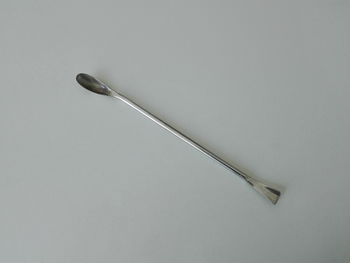Spatula
 |
This article is a stub. Please help Sciencemadness Wiki by expanding it, adding pictures, and improving existing text.
|
A spatula is a lab item, which has one or two ends with spoon-like scoops, or has flat ends, commonly used for transfering chemical reagents or other solids.
General
Spatulas are often made of metal, usually stainless steel, though plastic, glass or glazed ceramic spatulas are also available. Spatulas made of plain steel are generally avoided, to limit contaminating the reagents.
Metal spatulas are designed to resist most chemical reagents, though they are not compatible with strong acids, some salts (like copper salts) and halogens (iodine). It is not advised to hold them in an open flame for too long, as they will colorize.
Metal microspatulas are a smaller version of the common spatula, used for handling very small amounts of solids.
Metal and plastic spatulas are very often preferred over the glass or glazed ceramic ones, as they are not brittle and do not shatter if dropped on the floor (a very common occurrence in labs).
Wood spatulas are only compatible with dry non-corrosive reagents, preferably insoluble in most solvents. They are sometimes used when handling energetic materials.
Availability
Spatulas of all shapes and sizes are sold by lab suppliers. They can also be found on eBay or other online sellers.
Common kitchen stainless steel spoons can be used as spatulas, though the SS used for cutlery may not be as resistant to corrosion as the lab variety. Most PE or PP cutlery (best colorless or transparent) is compatible with most lab reagents. Just make sure to check it's actually PE or PP and not some other type of plastic which is not resistant to solvents.
DIY spatula
You can make a spatula by taking a metal rod and hammering the ends to a spoon or flat head form, with the aid of a flame.
To make a plastic spatula, use a heat gun as heating source.
